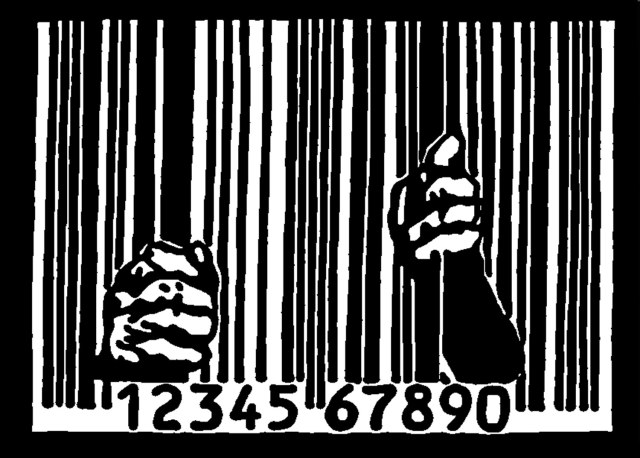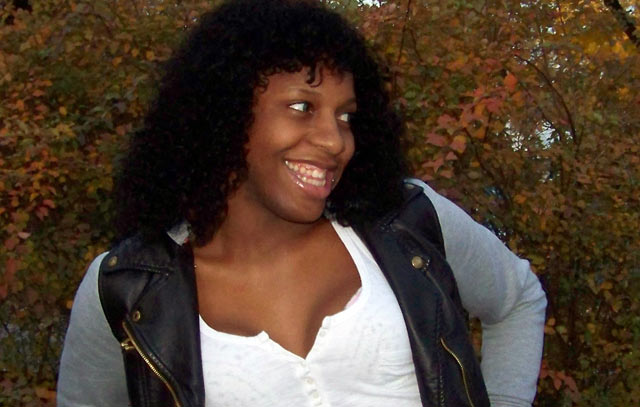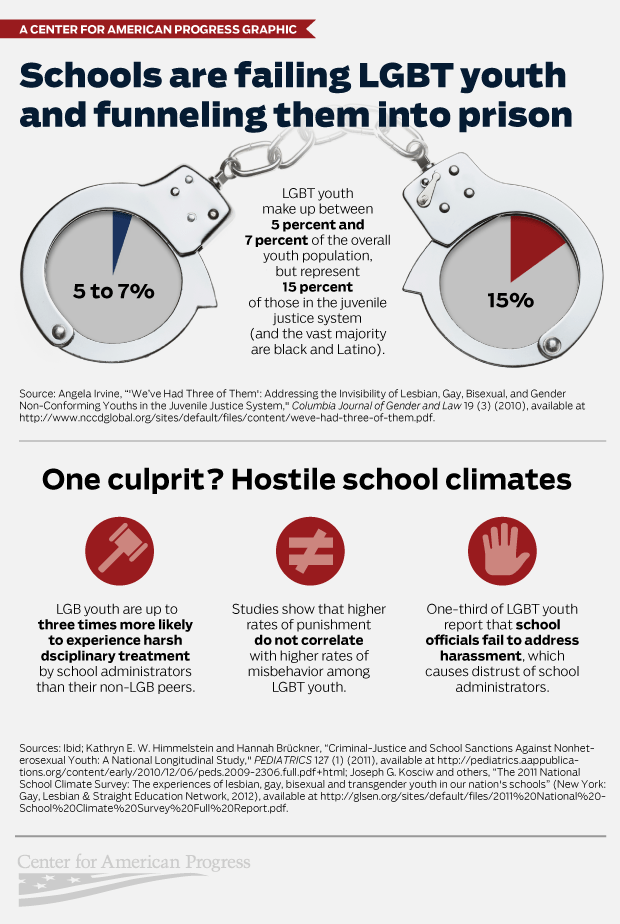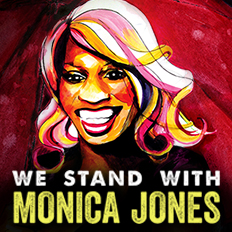Maybe you’ve heard, and maybe you haven’t, but I’m going to say it again because it’s still true: the criminal justice system in the United States is a fucked up institution that is every kind of -ist you can think of, and feeds off of the most marginalized bodies of our society in order for companies to maximize profits. It’s often called the prison industrial complex (PIC), a term coined by the activist group Critical Resistance.
The problems with the criminal justice system have been in the media more than usual in the past year. This is in part because of Orange is the New Black bringing the lives of fictional incarcerated women to our computer screens. It is also because of the outcry over the blatantly unjust treatment of CeCe McDonald, who served 19 months in prison after defending herself against a racist, sexist and transphobic attack, and the trial of Marissa Alexander, who is clearly being racially targeted by Florida Attorney Angela Corey, and could face sixty years in prison for firing a warning shot that hurt nobody into her ceiling while being threatened by her abusive husband.
The PIC is a massive system, and is defined by Critical Resistance:
“Through its reach and impact, the PIC helps and maintains the authority of people who get their power through racial, economic and other privileges. There are many ways this power is collected and maintained through the PIC, including creating mass media images that keep alive stereotypes of people of color, poor people, queer people, immigrants, youth, and other oppressed communities as criminal, delinquent, or deviant. This power is also maintained by earning huge profits for private companies that deal with prisons and police forces; helping earn political gains for “tough on crime” politicians; increasing the influence of prison guard and police unions; and eliminating social and political dissent by oppressed communities that make demands for self-determination and reorganization of power in the US.”
Because of the PIC, the US prison system currently houses 25% of the world’s prison population, when we only make up 5% of the general population.

The PIC is especially dangerous for queer and trans* people. Outside prisons, queer and trans* people are vulnerable to being targeted by law enforcement for gender identity and presentation. In prisons, queer and trans* people, and in particular trans women, face high rates of violence, sexual assault and harassment, especially from prison staff.
Learning about the many tentacles of the PIC has been a huge part of my coming into radical politics. There is inspiring and challenging work happening amongst communities of prison abolitionists to educate people about the PIC, to challenge the laws that keep it in place, and to make people’s current lives inside the system more dignified and humane.
Here are five important things I’ve learned about the PIC and prison abolition.

1. Prison is bad for everyone
Since CeCe McDonald’s release from prison in January, she has been an outspoken advocate against the prison system, giving interviews and meeting with abolitionist groups. In an interview with the Socialist Worker she said,
“I JUST feel like no matter what, prisons are bad for everybody. They aren’t just bad for trans people — they’re bad for all people. It wouldn’t be fair for me to make it seem like it was so hard for me, just as a trans woman, because I’ve been around a lot of people who don’t deserve to be in prison at all. Prison is hard for everybody. We’ve all got our personal issues and have to do what we need to do to survive in there and be strong.
“It’s not the right approach for people to sensationalize this story and say: You were a trans woman in a men’s prison. Because at the end of the day, all prisons are bad for all people — trans, cis, gay, straight, Black, white, Asian, brown, purple, polka-dotted, striped, zebra, alien or whatever.”
2. The PIC influences how we think about who is and is not dangerous.
If we are in the mindset of understanding that prisons are bad for all people, we can start to question the idea that there are some people who belong in prisons more than others. Dean Spade and Reina Gossett recently had an online discussion about prison abolition and addressed the question, “What about the dangerous people?”
Spade and Gossett encourage us to think more broadly about who is being held accountable for the violent acts they commit. The media and the state do a really good job of teaching us that the only way to stop a person who is violent is to lock them away. But as Gossett points out, the idea of people being either guilty or innocent is flawed:
“The one thing I go back to is Ruth Gilmore, who’s a professor at CUNY and one of the founders of Critical Resistance talks about, really importantly, no one is innocent. There’s not a violent person and a non-violent person. All of us together are doing things that are hurting other people. …there’s not a dichotomy of innocent people and guilty people. The logic of the state, of the prison system, demands that idea… so that all sorts of structures and all sorts of processes – like policing, prisons, imprisonment, deportation – can be justified. …I think there’s a really long history going back to slavery where the state was really dependent on this logic that “free black people” are incredibly dangerous …that poor people wandering are incredibly dangerous …so I would say that no one is innocent, people are consistently harming each other all the time. There are some people who are held accountable by the state for doing that kind of harm, and there are some people who will never be held accountable by the state… people who are running Blackwater, people who are running the military, or Obama…”
3. The PIC is in our Schools.
The School-to-Prison pipeline, which refers to the increased presence of police officers in schools, who are increasingly deferred to for disciplinary matters, makes schools more dangerous for queer and trans* youth, especially queer and trans* youth of color. As a result, more students are ending up in juvenile detention, and are more likely to be incarcerated as adults.

Having criminal interventions in schools has also led to cases like Jewlyes Gutierrez’s. Jewlyes was sixteen and assaulted by three cisgender girls who regularly harassed her. Jewlyes was charged with battery for defending herself, while her attackers saw no consequences. Cases like hers show us how trans* and queer youth can are unsafe within school systems, at the hands of their peers and adults.
4. Organizations are working to resist the dehumanization of incarcerated people by building community that transgresses prison walls.
Prison abolitionists are working to make life better for people in prison by building community across the walls.
Organizations like Black and Pink have pen pal programs for queer and trans* people between incarcerated people and people who aren’t incarcerated to build community and systems of support for people in and outside the system that look to abolish it.

“Our goal is liberation. We have a radical view of the fight for justice: We are feminist. We are anti-racist. We want queer liberation. And we are against capitalism. Prisons are part of the system that oppresses and divides us. By building a movement and taking action against this system of violence, we will create the world we dream of. We also celebrate the beauty of what exists now: Our love for each other. The strength of our planet. Our incredible resiliency. All of the power we have to continue existing. While dreaming and struggling for a better world, we commit to living in the present.”
5. People are showing up to protest mass incarceration
From the Free Marissa Now campaign to the Free CeCe Documentary to collectives working on transformative justice responses to violence, organizers across the country are standing up to fight the PIC.
Monica Jones, a black trans woman, is currently on trial for “manifestation of prostitution,” which she was arrested for while protesting the criminalization of sex workers through Project ROSE. She is fighting her case and working with Sex Workers Outreach Project (SWOP) of Phoenix to bring a report to the UN Human Rights Commission on the treatment of sex workers in the US criminal justice system.

Jones spoke out on A Kiss for Gabriela in anticipation of her trial, which has been postponed until April 11, about the urgency of the work to fight the criminal justice system:
“…police arrested more than 40 people in Phoenix for prostitution last night. I don’t have all the details yet but these ongoing arrests show that we have so much more to do to end the criminalization and incarceration of people due to the policing of victimless crimes. I won’t give up until all of this is ended.”








Comments
I’m surprised there’s no mention of Michelle Alexander or Angela Davis in an article about PIC. The role that capitalism plays is a lot greater than is discussed here. The profit driven institutions create demand for prisoners and drive mass incarceration.
Most importantly, that the drug war is the new Jim Crow is so critical. The ways in which PIC reproduces race is one of it’s most horrendous products. It’s surprising to see a discussion of PIC without noting race.
I’m happy that PIC is getting more exposure, and I’d love to see more articles about it in the future.
YES. Thanks for your comment. I think the roles of race and capitalism are hugely important parts of understanding the PIC, and this is a far from comprehensive list of everything there is to know. But I hope this article can be a good jumping off point and people will share their thoughts and resources in the comments. Definitely look for more on the PIC in the future.
While there’s no direct mention of Angela Davis, she was a co-founder of Critical Resistance which was profiled. I also feel like the author did bring up the disproportionate entrapment of people of color in the PIC numerous times, but I agree it’s important to centralize the experiences of oppressed people.
The article speaks to me on a lot of levels, thank you for writing it! I highly recommend this Ted talk to all the humans if you haven’t already watched it-http://www.ted.com/talks/bryan_stevenson_we_need_to_talk_about_an_injustice
My entire education was constructed around the US’s PIC as though it was a horror story that Canada could never go towards. Naturally, that ignored the problems of our own PIC and how it is colonial through and through.
I guess looking at this article, I wished my degree had engaged far more with our PIC here in Canada and critically looked at it, addressing how it is colonialism. Our very conceptualization of ‘risk’ and ‘dangerous’ reinforce colonial realities. I’ve never gotten to really discuss how I’m supposed to work in a justice system that is inherently unjust.
Yeah, something I didn’t touch here, but I know is a thing, is the way that the PIC is being globalized. For example, since the US started building the border wall and the contemporary system of immigrant detention and deportation, border walls and detention centers have sprouted up all over the world, using a lot of the same companies and technologies. US border patrol is training other border control agencies.
I imagine similar things are going on with other countries’ criminal justice systems, and from what I’ve heard, Canada has a lot of similar issues to the US in terms of how it sprouts from histories of racism and colonization.
Australia has a lot of problems, too, especially with the disproportionate imprisonment of Aboriginal people. (Shit yes to the colonialism!)
For Queensland the figure is 1% of the population identifying as Aboriginal and 20% of the prison population. There are difficulties measuring the Aboriginal and Torres Strait Islander population, since it’s largely a matter of identity and there’s a diverse population subject to a complex variety of factors influencing the decision to idenfity as ATIS on forms etc,
I have the same problem living in the UK. Our entire civil rights education was USA so they could point out the atrocities of the past without us questioning the role the UK had in them. It was only in university that the phrase “colonial attitudes” started to be used.
Thanks for this article, it is such an important topic. I’m currently reading Assata Shakur’s autobiography and her insights into the PIC are harrowing.
I highly recommend looking up Gender Anarky (if you haven’t already). I recently found a zine of writings from their founder, Amazon, a first nation trans* activist in a federal prison. Their writings are radical and completely changed my understanding of the hierarchies amongst the incarcerated:
http://genderanarky.wordpress.com/writings/
Autostraddle, wow. You keep getting better every day. Please keep posting this kind of stuff.
Terrific piece Maddie. Thank you. Yeah our “justice” system scares me so bad. The very thought of going through that meat grinder is one of the worst nightmares I can think of. People really don’t get how massively out of line we are but I saw a Bill Moyers piece about it a month or so ago and here’s a statistic that sticks in the mind. The US incarcerates more people than China! An athoritarian state with four times our population. Fuck, that’s sickening.
If y’all are able, a few thousand incarcerated LGBQ/T members of Black & Pink would really appreciate your friendship!
There’s a four step list on to get you set-up with a penpal!
I’ve been writing to my pen-pal Shaylanna () since 2009, and I really cherish getting to know her better each month! Thanks in advance!
Is this a thing you can do if you’re outside North America? (The UK, more specifically)
I also want to know this, or if there are any similar programs in Australia (or other countries, for the folks who live there).
Hey guys,
If you’re interested in the penpal stuff but you don’t want to make your penpal send letters internationally (probably quite hard for incarcerated people) there is a UK equivalent called Bent Bars (http://www.bentbarsproject.org/get-involved).
They were very slow to respond when I applied (we’re talking 15 months!) but I think I may have got lost in a pile of applications and forgotten about. I’ve just confirmed with them that I’m still interested but haven’t had anything back yet. Sorry that I can’t tell you more about the process but hopefully you’ll have a bit more luck getting started.
As a youngster of this world, I haven’t been exposed to many things and this article revealed me to one of those many things. I’ve heard of folks being against how the prison system works, but I’ve never heard of people desiring to abolish it all together unless I’m misinterpreting what you all are saying.
Is this article more of calling for an abolishment of the way the system works or for abolishment of the system entirely? Sorry if I’m misinterpreting.
Good question! So, yes, prison abolition is the vision of prisons, as a whole, being abolished. The idea is that the prison system is violent and creates violence, and if we want to end violence, we have to end the prison system and create new ways of responding when people are harmed without creating more harm.
I hope that clarifies a little bit. To learn more about prison abolition in particular, I would highly recommend watching the rest of the videos from Dean Spade and Reina Gossett. They are really excellent at explaining it.
I honestly don’t know how I feel about this whole “prison abolition” business. On one hand, yes, plenty of people, especially those of color, the poor, etc, end up in prison when they shouldn’t. And Taystee’s whole storyline on OITNB was a great example of what happens when some of the most vulnerable among us feeling safest IN prison, which is a problem. Healthcare, etc. For instance, my uncle cannot seem to stay out of prison. He is mentally disabled, from the rez, and lives below the poverty line. He has very little resources at his disposal to stay OUT of prison. He’s never really done anything truly bad—he’s thrown animals at the pound over the fence to keep them from getting euthanized, he kidnapped his daughter (who is in foster care for neglect) and stole my dad’s car to do it, taking her across several state lines). Most recently he hoarded a dead body (it’s a long story.). He’s never raped/killed/etc. He doesn’t need jail; he needs help in the real world.
I was in a group home; I know plenty about how society pegs a person as “bad” from childhood and they tend to live up to it. Plenty of my foster sisters have rap sheets, have lost their kids, etc.
BUT I’m sorry, there are plenty of people I’d like to rot in prison forever. And ever and ever and ever. These tend to be the people who never see the inside of a cell. The sick, disgusting killer of my childhood babysitter was acquitted. The husband of my mom’s friend who killed his wife and framed it on his three year old (who I played barbies with) only just went to jail, almost twenty years after the fact. The guy who molested me and three others only went to jail for six months after raping a twelve year old (it was decided that it was “just” stat rape because he said it was consensual.) Etc etc etc. I would like them to rot in hell forever, and jail’s the closest thing. They don’t need rehabilitation. They need harsh punishment. And the chances are that they won’t get it. Keeps me up at night.
Just my two cents.
I think this is a good point, and thank you for sharing your experiences, too. It seems like what you’re getting at is the need for a system that deals with violence, rather than a system that targets people who are struggling. I don’t think that can’t go alongside prison abolition.
Something I really admire about the people I’ve learned about prison abolition from is that they do a lot of work to both address the reality of the system right now, while ultimately working towards something entirely different in the future. It’s a really really long-term process and vision to create a world that is different. There was a good related article to this in Prison Culture a few days ago.
You are entitled to your emotional reaction to the past traumas you have face, but no. Prison should be restructured to focus on rehabilitation no matter what the person did. Negative reinforcement is not nearly as effective as positive reinforcement and once the punishment has been taken away, without being taught exactly what they did was wrong and how they can change, they are highly likely to re-offend. This is why re-offending rates are so high. Harsh punishments dont work, they only make the punished feel like they did something when they most likely just made things worse (increased resentment and taught that violence really is okay)
You say that they should be put away forever, but that rarely happens. Instead people, some who even do bad things like you said, are pushed into a violent system, learn to adapt to it to survive and pushed back out into civilian world without being taught how to correctly function there. This all happens without any true learning taking place. Those people are doomed to endlessly re-offend and with every sentence it gets more and more hard for them to get a job so they can survive in our capitalist society. If they cant get a job to become a “good citizen” why bother trying? Why not just commit another crime to get through back into prison where they are at least guaranteed a warm bed and food everyday? Hence the cycle of re-offending.
The prison system fixes nothing, it only offers the appearance of a solution by taking people out of others sight. Once in prison no true rehabilitation takes place, since even if they do talk to a psychologist (maybe a hour a day but more likely just a few hours a week) they spend the rest of the time in a violent system. I have talked with two psychologist who have worked with registered sex offenders and they have nothing positive to say about the PIC.
PIC is so incompetent that it is structured to keep funneling people back into the system, rather then more final solutions rehabilitation or locking away people forever. What kind of prison reform do you want to fight for? One that helps people change their ways and become functioning members of society or one that locks people away forever? And who do you really think are going to be the ones being targeted by this new system? Is it really worth it to lock away thousands, millions and maybe even billions of people for nonviolent crimes (who are the majority of prisoners) just so a few bad apples are truly out of sight and out of mind?
Okay but what happens when rehabilitation doesn’t work, eh? What then? How do trust that a serial killer or serial rapist is completely “rehabilitated” and won’t hurt someone again? You can’t know that. And then blood would be on your hands. A mentor of mine was in college when a serial rapist was let out of a rehabilitation program (b/c he was one of the first “sex addict” cases) and kidnapped her and raped her over a period of several days. He was planning to kill her. Fate stepped in and she managed to escape, but not without both lifelong psychological and physical problems.
Look, you obviously haven’t experienced much/you should probably stay away from trauma victims if you’re saying someone like the offenders I mentioned are “entitled” to rehabilitation.
Also, thanks for the silencing “you’re entitled to your emotional reaction.” It’s not an “emotional reaction.” Goodness gracious. It’s life experience, and my personal opinion.
I think the current prison system is racist, classist, xenophobic, and is horrible to those who are intellectually disabled. Rape is a huge problem in women’s prisons, and let’s not even begin with issues like Gitmo. I think there needs to be major reform, but my personal opinion (based on my education and life experiences, just like yours) goes against “prison abolishment.” I personally believe that realistically speaking, there will always be a need for a holding place for violent, sadistic individuals. Rehabilitation should be reserved for those who will actually benefit from it, those who need it. Not the aforementioned.
Peace out.
Thank you for this article Maddie. I agree so much about what you said and it’s such a horrible tragedy to see how people’s lives are destroyed by prison. I once was a part of an organization that discussed this. The only thing that I remembered was hearing that black boys are set up to fail. That really struck a chord with me because it was against all of the propaganda that is forced down our throats as children. Equality does not exist and we are no better than countries like Russia and China.
Recently in New York State Governor Cuomo wanted to allow financing so those in prison can get an associates or bachelors degree.
http://www.nytimes.com/2014/02/19/opinion/gov-cuomos-bold-step-on-prison-education.html?_r=0
This has been panned where I live in central New York. My first thought was that this was a great idea. As the stats show, it would actually be cheaper down the line. Of course the fact is that people have this very negative view of those in prison. They consider them violent psychopaths no matter what they may or may not have done. There were even sheriffs that were speaking out about how this was a useless endeavor. In their minds they were already too far gone once they reach prison so educating them is useless.
To me all I think about is that there are so many people out in the world that have committed crimes but get away with it for so many reasons. So to say that someone who got away with a crime can go to college while those that are serving their time cannot is blatant hypocrisy. How are we to know that the people that get financial aid are 100% perfect?
Excellent article, Maddie. I’m going to add to the voices here that Autostraddle has delivered some amazing stories the past week. So many things I’m now passionate about (or against), I get from you all, so thank you so much for talking about more than just queer celeb gossip (which I know you never had exclusively done, but it’s so important to keep this quality up).
maddie this is so well written and informative and important. which isn’t surprising at all, but i just wanted to chime in and say thanks for writing this. i have felt a lot of my passion and anger dying down since leaving college (it’s hard to remain actively vigilant when everyone around you tells you to calm down and mellow out instead of encouraging you to learn more and be productively furious about the injustices of the world) and i often feel like your articles snap me back to reality and i appreciate it so much.
Thanks Vanessa! I like the way you put it – being productively furious.
I’ve been meaning to get involved with Black and Pink. Thanks for the info!
hey FYI the term ‘prison industrial complex’ wasn’t coined by CR but Mike Davis in the 1995 article “Hell Factories in the Field” published by The Nation. Both Ruthie Wilson Gilmore and Angela Davis cite this fact in various books/articles. They were definitely in convo with him in the years leading up the founding conference of CR in 1998.
I also just want to emphasize the importance of centering the role of anti-Black racism and racial capitalism as a key hinge of prison system. It should always be front and center of our understandings of the how incarceration came to be the catchall solution to the political and economic crises of the last 40 years.
I just want to join the chorus of folks saying this is excellent and I would love to see more stuff like this on Autostraddle. Great job, Maddie!
Chicano Mexicano prison project in San Diego
Great article; thank you Maddie! I would love to see more of this on Autostraddle (secretly I would like to write about this on AS)–and by “this” I mean modern capitalist slavery. You’ve covered just the insidious tip of the ice berg that is the PIC; it gets more and more disgusting as knowledge about it surfaces and spreads. ~I started to write an entire book of a comment, but I decided to delete it.~ Long story short, capitalism needs the PIC to survive, both of which work to destroy queers and queer culture (as well as almost everyone else and almost every [commodifiable] culture).
casually citing this for my term paper on the PIC, jsyk
!! that’s awesome. i’m so glad it was a helpful resource for you.